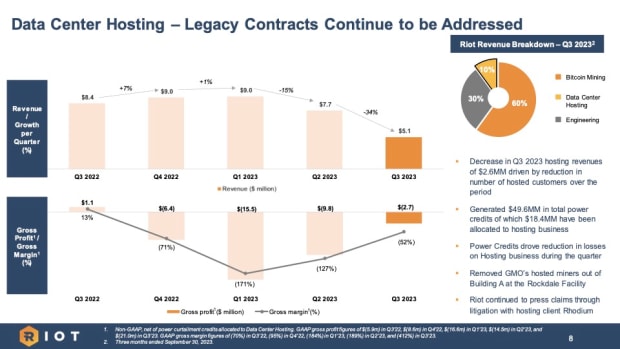Texas Bitcoin mining operation shut down by host’s armed security

Last Monday, November 27, a private security team from Whinstone Inc. entered the premises of Rhodium Enterprises in Rockdale, Texas to remove employees in an effort to shut down operations at the 125 MW Bitcoin mining facility.
The legal battle that culminated in this seizure began on May 2, 2023, when Whinstone US, Inc., a subsidiary of Riot Platforms, filed a lawsuit against certain rhodium entities. The dispute centered around hosting and energy contracts between the two parties, and Whinstone sought damages for unpaid hosting fees and filed a declaratory judgment asserting its right to terminate those contracts.
Rhodium did not take the accusations lightly and worked with outside counsel to refute them with its own arguments. It sought damages and filed a motion to compel arbitration for Whinstone’s alleged violations of certain hosting agreements. The court sided with Rhodium and granted the motion, ordering the case to be resolved through arbitration. In a document titled “Rhodium Motion to Compel Arbitration and Counterclaim,” filed on June 12, 2023, Rhodium documents these power contracts signed in July 2020. This was especially before supply chain issues and shutdowns led to energy price inflation over the next two years. Financial stimulus increases power costs at Rockdale site.
“In July 2020, Whinstone and Rhodium JV entered into 14 identical power contracts, each providing for Rhodium JV to receive 5 MW of power from Whinstone (the “5 MW Contracts”). The core objective of each agreement was to supply electricity (a total of 70 MW) at a fixed price for at least 10 years. It states that each of the 14 5MW contracts supersedes all previous or contemporaneous agreements between the parties relating to its “subject matter”. Whinstone and Rhodium JV signed a total of 20 5MW contracts, but Rhodium supplied power in only 14 of those contracts. So only those 14 are relevant for present purposes.”
Riot Platform, then known as Riot Blockchain, eventually acquired Whinstone Inc. on May 26, 2021, acquiring the rights to these power contracts signed in 2020. Riot’s Q3 2023 quarterly update called these contracts “legacy contracts.” Page 8 states, “Power credits led the decline in losses in our hosting business during the quarter.”
“Data center hosting revenue was $21.8 million and $27.9 million for the nine months ended September 30, 2023 and 2022, respectively. The decrease of $6.1 million is due to a lower revenue share for our customers due to the decline in the value of Bitcoin in 2023, as noted above, and hosting fewer customers in 2023 as we continue to process legacy contracts.”
This means a decrease in net revenue for its data center hosting business, especially since the page title states that these “existing contracts continue to be resolved.”

In the June 12, 2023 motion, Rhodium argues that Whinstone not only does not owe the money, but actually owes Rhodium money because of the unshared profits from selling energy back into the ERCOT market.
“Public records show Whinstone has sold more than $100 million worth of power to the ERCOT market over the past several years. In 2022 alone, Whinstone’s sales reached $30 million… Based on the percentage of Whinstone’s total power allocated to rhodium, rhodium should receive approximately 25-30% of Whinstone’s ERCOT market sales revenue. .. But Whinstone did not pay a certain amount for rhodium. That’s a dollar of profit from energy sales. In fact, Whinstone’s former CEO flatly told Rhodium employees that Whinstone would not meet its obligation to share profits from energy sales. Since August 2022, Rhodium has repeatedly demanded payment of profits from Whinstone’s energy sales. In total, Whinstone owes Rhodium at least $7 million to $10 million in unpaid energy sales revenue. In reality, the amount is likely to be tens of millions of dollars or more.”
The same page 8 of Riot’s Q3 2023 quarterly update notes a significant precedent: the removal of “GMO-hosted miners from Building A of the Rockdale facility” in 2022. In a document filed by Japan’s GMO on July 12, 2022, Winston was accused of seizing power and mining equipment in a similar manner.
“On or about March 29, 2022, Whinstone improperly removed certain of GMO’s mining machinery in violation of its obligations under Section 3.1.3 of the Texas Agreement (although Whinstone permitted relocation of the equipment only with GMO’s prior written consent). You did not request this). acquisition) and Section 14 of the Texas Agreement (which only allows Whinstone to suspend service under certain circumstances, neither of which apply). The removal of Whinstone/Riot’s GMO machines reduced GMO’s mining capacity by approximately 20 petahashes, which amounts to at least $16,000 in revenue per day. GMO requested return/replacement of the equipment and sent an official notice on April 12, 2022, but received no response. And on a visit to the Rockdale data center on May 7, 2022, GMO employees discovered that the machines were not operational again, but had instead been replaced with Whinstone machines operating for Whinstone’s own benefit. Despite multiple demands to put the GMO machines back in place, Whinstone refused.”
It is implied that these actions against Whinstone’s GMO were undertaken in response to rising energy costs at the Rockdale site, and further reference to the complaint reads:
“Whinstone also recently billed GMO for an increase in power prices from $0.0285/kWh to $0.03/kWh (resulting in an increase in costs of approximately $50,000.00 per month). Ostensibly, this is because Whinstone must pay its supplier, TXU Energy, for power. It is set to increase. However, the 2019 Texas agreement stipulates that the power price of $0.0285 per kWh “will not increase for 10 years” and that thereafter “the parties shall negotiate in good faith on the price.” Whinstone’s right to pass on increases is strictly limited to regulatory changes and similar charges. Despite GMO formally contesting the rates and seeking clarification, Whinstone has provided no explanation or evidence that this power price increase meets its criteria. “The latest charges therefore constitute additional violations of the 2019 Texas Compact.”
Page 20 of Riot’s 10-Q lists GMO’s fourth amended complaint against Whinstone, which seeks total damages of just $650 million.
“On June 13, 2022, GMO Gamecenter USA, Inc. and its parent company, GMO Internet, Inc. (collectively, “GMO”) filed a lawsuit in the U.S. District Court for the Southern District of New York (Case No. 1:22) -cv-05974-JPC) sought damages in excess of $150 million against Whinstone, alleging breach of contract under the colocation services agreement between GMO and Whinstone. Whinstone responded to GMO’s claims and filed its own counterclaim, alleging that GMO itself breached the colocation services agreement and seeking declaratory judgment and damages in excess of $25 million.”
On October 19, 2023, GMO sought an additional $496 million in damages for lost profits and profit sharing based on Whinstone’s alleged wrongful termination of the colocation services agreement dated June 29, 2023. A fourth amended complaint was filed. At this preliminary stage, the company (Riot Platforms) believes that GMO’s claims lack merit. However, because this litigation is still in its early stages, the Company cannot reasonably predict the likelihood of, or the magnitude of, an adverse outcome.”
GMO’s lawsuit against Whinstone is still ongoing, but the legal battle between Rhodium and Whinstone continues. Dissatisfied with the arbitration decision, Whinstone and Riot unsuccessfully filed for reconsideration. Unwilling to yield, they sought relief from the Court of Appeals, but their request was denied on November 22.
This led to the shocking move of Whinstone sending Rhodium a notice at 10pm on Monday 27 November, stating that it was terminating certain hosting agreements with immediate effect. This quickly escalated as Whinstone cut power to the Rhodium facility in Rockdale and used private security to remove employees and revoke access, most notably without altercation.
Responding quickly to what appeared to be a unilateral and drastic action, Rhodium worked with outside counsel and filed for a temporary restraining order the very next day, November 28. This order sought to restore full access to and use of Rhodium. facility.
The judge in charge of the case granted Rhodium’s request for a temporary restraining order on Wednesday morning, November 29. “A further hearing on this matter will be held on Tuesday,” according to an email sent to Rhodium investors the same day. , December 5” will finally decide the fate of the temporary restraining order.
At the time of publication, neither Rhodium nor Riot Platforms had commented on the ongoing litigation.



